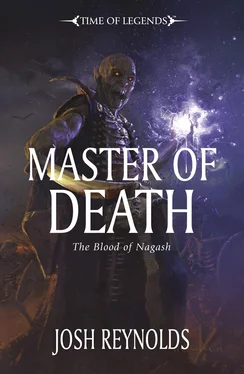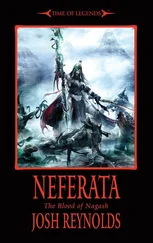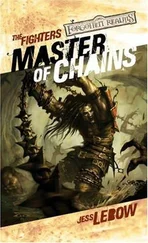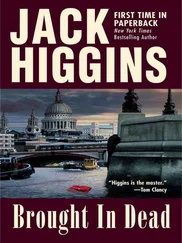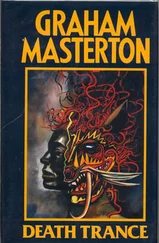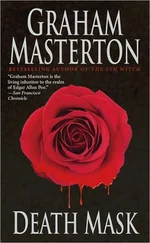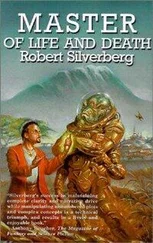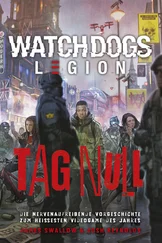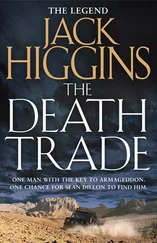Josh Reynolds - Master of Death
Здесь есть возможность читать онлайн «Josh Reynolds - Master of Death» весь текст электронной книги совершенно бесплатно (целиком полную версию без сокращений). В некоторых случаях можно слушать аудио, скачать через торрент в формате fb2 и присутствует краткое содержание. Год выпуска: 2013, ISBN: 2013, Издательство: Games Workshop, Жанр: Фэнтези, на английском языке. Описание произведения, (предисловие) а так же отзывы посетителей доступны на портале библиотеки ЛибКат.
- Название:Master of Death
- Автор:
- Издательство:Games Workshop
- Жанр:
- Год:2013
- ISBN:9781849705271
- Рейтинг книги:4 / 5. Голосов: 1
-
Избранное:Добавить в избранное
- Отзывы:
-
Ваша оценка:
- 80
- 1
- 2
- 3
- 4
- 5
Master of Death: краткое содержание, описание и аннотация
Предлагаем к чтению аннотацию, описание, краткое содержание или предисловие (зависит от того, что написал сам автор книги «Master of Death»). Если вы не нашли необходимую информацию о книге — напишите в комментариях, мы постараемся отыскать её.
Master of Death — читать онлайн бесплатно полную книгу (весь текст) целиком
Ниже представлен текст книги, разбитый по страницам. Система сохранения места последней прочитанной страницы, позволяет с удобством читать онлайн бесплатно книгу «Master of Death», без необходимости каждый раз заново искать на чём Вы остановились. Поставьте закладку, и сможете в любой момент перейти на страницу, на которой закончили чтение.
Интервал:
Закладка:
‘Take me to them. Now,’ W’soran grated.
With Melkhior leading the way, they left the cavern and moved upwards through the mountain. Even with slaves, it would have taken decades to make the mountain habitable. With the dead, however, the rudiments of civilisation had been constructed within a few years. Thousands of zombies and skeletons had worked day and night, bracing caverns and widening tunnels. The corridor from his workshop was braced by the uncomplaining shapes of massive skeletal conglomerations — things composed from the skeletons of many beasts and ghouls, their overlarge limbs bound in sturdy chains and leather straps and the surface of their mouldering bones inscribed with runes of abn-i-khat. They were a parody of the great ushabti of Nehekhara, and like those monstrous statues, there was a faint flicker of awareness in the eye-sockets of their wide, blended skulls.
More such creations — part guard dog and part decoration — lined the corridors and tunnels. A chattering skull, wreathed in sorcerous flames, cast light across a small bend in a tunnel, and the bones of a multitude of skaven had been used to craft a bridge across a gap. Everywhere there were guards, clad in the remnants of the armour and furs they had worn while alive.
‘Who came?’ W’soran asked as they walked. ‘Who was it, the courtesan or that spindly nomad? Who did she send?’
‘No, neither of them,’ Melkhior hissed as he idly traced an old scar on his chest. While they had been in Mourkain, W’soran’s followers and those of Neferata had clashed more than once in the shadows of the blighted city. Melkhior had nearly had his head taken by one of Neferata’s witches — a nomad woman named Rasha. She had transformed into some form of desert cat and torn his apprentice open and hurled him from a rooftop. Melkhior, far from burning with a desire for vengeance, seemed to consider her murderous assault as a form of flirting. There was no accounting for taste with barbarians. W’soran himself had never been inclined to the company of women.
Melkhior shook himself. ‘One is a Strigoi named Layla, the other an Arabyan named Khemalla.’
The names sparked no memories in W’soran’s mind. He grunted irritably. ‘Do you know them?’
‘One was a scullery maid, the other a slave, or so I heard,’ Melkhior said. ‘Neferata prefers her pets already broken.’
W’soran didn’t reply. Melkhior’s biases were showing, and he felt no urgent need to correct his apprentice. If anything, the opposite was true — Neferata chose her followers for reasons other than devotion. Sometimes, he thought she had the right of it. W’soran had always chosen scholars, men like himself. Like minds made for easier work.
But when he’d arrived in Mourkain, Ushoran — damn his eyes — had thrust a bevy of unlettered savages upon him, and demanded he teach them his arts. It was the price of sanctuary and after everything that had occurred in the east, he was happy to pay it. Still, it had meant long years of training brutes like Melkhior in the subtler thought-processes required of a scholar — of them all, only Morath had shown a natural inclination in that regard. Zoar had been helpful in those early days, and the few others who’d accompanied him from Nagashizzar.
Of that group, only Zoar remained. As to whether he or Melkhior, or even Neferata was responsible for that, W’soran had no interest. He cared nothing for any particular acolyte. They were simply tools.
‘What will you do, master? Vorag might be angry if you simply intrude uninvited…’ Melkhior went on.
W’soran smirked. ‘Only if he’s cavorting with them,’ he said. The smirk faded. ‘No, Vorag needs me and he knows it. That slattern of his is the one behind this insult. Where is Zoar?’
‘I left him to watch over our guests,’ Melkhior said. ‘Vorag is giving them a tour, and crowing of his conquests.’ He hesitated. ‘Do you think — could this be a trap? He abandoned her, after all. She is not forgiving of betrayal…’
W’soran chuckled bitterly. ‘She is if there is an advantage for her in it. No, knowing her, she’s already scheming to pull Ushoran’s empire out from under him.’
They reached the main cavern — the courtyard to Vorag’s citadel — a moment later W’soran realised that something was different. There was a smell on the stale air, a whiff of familiar magics. ‘Morath,’ Melkhior growled. ‘I can smell his stink on the air.’
‘No,’ W’soran said. ‘Not quite.’ He looked around the cavern. It had changed much in the years after the skaven had been driven out. The mountain had been all but hollowed out by the burrowing ratkin, and thus easy to make over into something more fitting for the kind of warrior-king Vorag imagined himself to be. The unstable walls of the cavern had been stabilised by the addition of smooth stone slabs and beams of petrified wood which criss-crossed the vast belly of the cavern like the bracers of a mine shaft. Stone stairways and balconies had been constructed, overlooking the interior from on high. Vorag had wanted it to look as much like Ushoran’s palace as possible, though he hadn’t admitted as much openly. It amused W’soran to think of Vorag aping his former king even as he sought to filch his kingdom.
There were cosmetic differences, of course. The nooks and crannies of the cavern had been filled with skulls, and the pelts of skaven, trolls and other beasts of the mountains lined the walls, flayed and stretched as trophies to Vorag’s might. In the years they’d fought and occupied the mountain, Timagal Vorag had made himself quite at home.
Vorag stood in the centre of the cavern, hands behind his back, and a wolf-skin cloak across his brawny shoulders. Stregga stood beside him, as well as Sanzak and a few other Strigoi besides. With them stood Neferata’s envoys, apparently listening to Vorag’s blustering braggadocio with keen interest.
Both were dark-headed, though one was quite obviously of Strigos and the other an Arabyan — not a nomad, but one of the city dwellers. They were dressed in travel-stained leathers and furs, and both had heavy swords belted to their waists. The Arabyan wore a gold band around her head and the other had her hair bound in ratty coils. Zoar lagged behind the group, nervously rubbing his hands.
W’soran and Melkhior strode swiftly towards them, and it wasn’t until they got closer that W’soran realised that there were dead men in the cavern, and not ones who had been raised by his magics. These were different. They were old things, steeped in death, and heavily armoured. Great bat-winged helms covered their skulls and coats of rusty mail hung from their mummified frames. Ancient cuirasses, embossed with new symbols, covered their torsos. Each carried a heavy shield and had a blade belted at their waist. The dead men examined the newcomers with glowing eyes and W’soran bristled. ‘That witch,’ he spat.
The dead men were wights. Though they resembled skeletons, the wights were as far beyond those pale remnants as vampires were beyond men. There were minds within those brown, root-encrusted skulls, albeit minds warped and shredded by dark magic. It took more skill than he had thought Neferata possessed to bring such creatures back from the grave.
‘Morath’s doing,’ Melkhior snarled as his hand flew to the hilt of his sword. The wights reacted instantly. Bronze swords gone green with age sprang from rotted sheaths and the long-dead warriors stepped forward with deadly intent. W’soran raised his hands, ready to unleash a fatal spell.
‘Stop,’ Vorag bellowed, throwing up his hands, his face mottled with fury. ‘If a spell leaves your withered lips, W’soran, I will rip out your scrawny throat.’
Reluctantly, W’soran lowered his hands. Melkhior had already released his sword and stepped back. Zoar hurried over to them, gnawing his lip. ‘I wanted to warn you master, but-’
Читать дальшеИнтервал:
Закладка:
Похожие книги на «Master of Death»
Представляем Вашему вниманию похожие книги на «Master of Death» списком для выбора. Мы отобрали схожую по названию и смыслу литературу в надежде предоставить читателям больше вариантов отыскать новые, интересные, ещё непрочитанные произведения.
Обсуждение, отзывы о книге «Master of Death» и просто собственные мнения читателей. Оставьте ваши комментарии, напишите, что Вы думаете о произведении, его смысле или главных героях. Укажите что конкретно понравилось, а что нет, и почему Вы так считаете.
